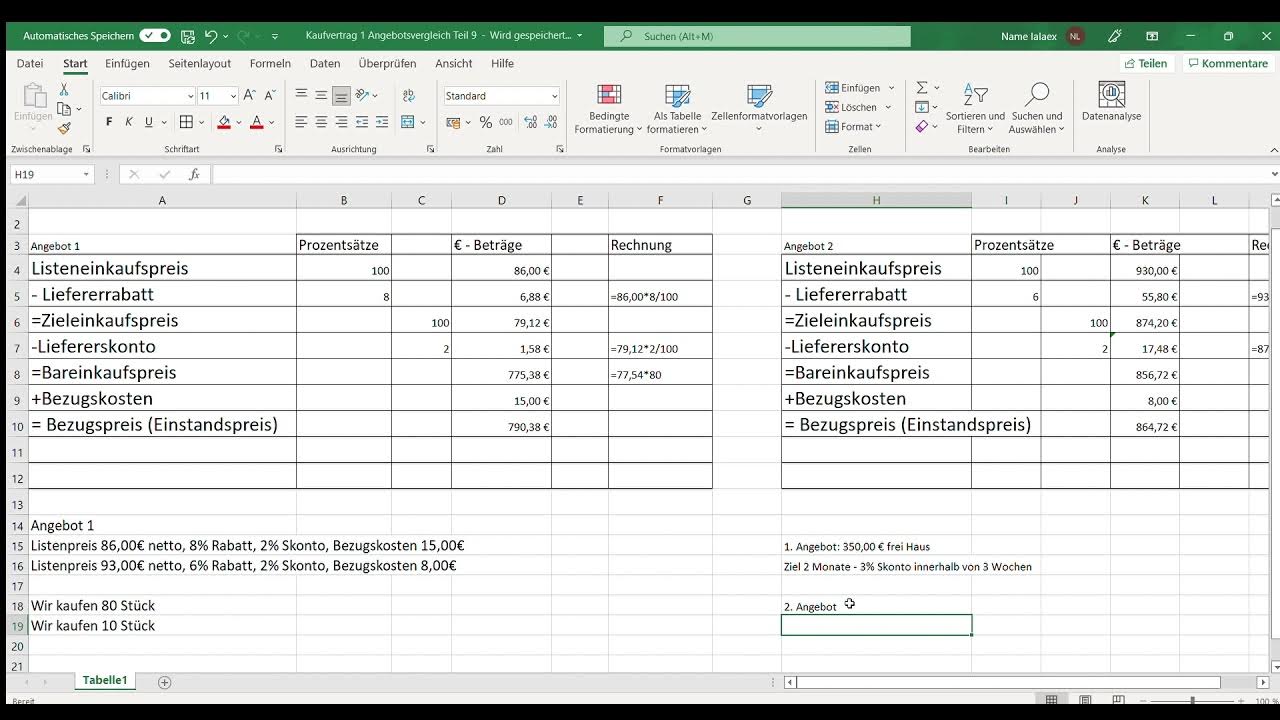Angebotsvergleich übungen Mit Lösungen

Okay, let’s be real. "Angebotsvergleich Übungen mit Lösungen" doesn't exactly scream "weekend fun," does it? But trust me, once you crack the code, you'll be saving money and making smarter decisions faster than you can say "Schnäppchenjäger" (bargain hunter!). Think of it as a life skill, like parallel parking or understanding the offside rule in football – initially daunting, but incredibly useful once mastered.
So, what exactly are we talking about? Angebotsvergleich simply means comparing offers. And the "Übungen mit Lösungen" part? That's the training exercises with solutions, designed to make you a pro. We’re basically learning how to dissect different offers, weigh their pros and cons, and ultimately choose the best one for *you*.
Why Bother? The Art of Being Clever
Why not just grab the first thing that looks shiny? Well, because you're smarter than that! Comparing offers isn't just about finding the cheapest price; it's about finding the best value. Think about it: are you buying a bargain bin smartphone that will die in six months, or investing in a slightly pricier model that will last for years and be more enjoyable to use?
Imagine you’re planning a city break. You see flights advertised for €50. Score! But then you notice baggage fees, airport transfers, and the fact that it lands at 3 AM in a city 30km from your hotel. Suddenly, that €50 flight doesn’t seem so appealing. Comparing that with a €80 flight landing at a reasonable hour, including a small suitcase, and arriving closer to your hotel suddenly makes the more expensive option a steal! This is where Angebotsvergleich shines.
Let's Get Practical: The Übungen (Exercises)
Don't panic! The exercises aren't as scary as they sound. Here’s a breakdown of what you'll typically encounter:
- Scenario Analysis: These exercises present you with real-life situations – choosing a new phone contract, finding the best energy provider, or selecting a mortgage.
- Spreadsheet Skills: Yes, Excel (or Google Sheets) might be involved. Learn to create simple spreadsheets to compare prices, features, and terms side-by-side. Think of it like organizing your spices – everything in its place!
- Critical Thinking: This is where you really hone your skills. Learn to spot hidden fees, read the fine print, and understand the true cost of each offer.
Where to find these exercises? Plenty of websites offer them! Look for sites focusing on personal finance, consumer advice (Verbraucherzentrale is a great resource in Germany), or even online banking tutorials. And the "mit Lösungen" part? That's crucial! It allows you to check your work and understand where you might have gone wrong.
Tips & Tricks for the Angebotsvergleich Master
Here are some golden rules to keep in mind:
- Define Your Needs: What are you really looking for? A basic cell phone for calls and texts? Or a super-powered smartphone for streaming and gaming? Knowing your needs helps you filter out irrelevant offers.
- Compare Apples to Apples: Ensure you're comparing like with like. Is that cheaper insurance policy offering the same coverage? Are you comparing prices *including* VAT (Mehrwertsteuer)?
- Read the Fine Print: This is non-negotiable. Understand the terms and conditions, cancellation policies, and any hidden fees.
- Don't Be Afraid to Negotiate: Sometimes, just asking for a better deal can work wonders! Especially with things like insurance or internet providers.
Pro Tip: Use price comparison websites – they do a lot of the heavy lifting for you! But always double-check the results and read reviews before making a decision.
Cultural Context: The German Approach to Savings
Germany has a reputation for being thrifty, and Angebotsvergleich plays a big role in that. It's about being a savvy consumer, making informed choices, and getting the most bang for your buck. Think of it as the 21st-century version of your Oma clipping coupons from the newspaper.
You'll often hear Germans discussing things like "Preis-Leistungs-Verhältnis" (price-performance ratio) – it’s embedded in the culture to seek out products or services that offer good quality at a reasonable price. You'll find this practice applies to just about everything from electronics to grocery shopping.
From Exercise to Everyday Life
Learning to compare offers is like equipping yourself with a superpower. It's not just about saving money (although that's a definite bonus!). It’s about making conscious decisions and feeling empowered as a consumer. When you learn to weigh the pros and cons, to understand the fine print, and to negotiate for a better deal, you gain a sense of control over your finances and your life.
So, next time you're faced with a purchasing decision, remember the principles of Angebotsvergleich. Take a moment to compare your options, weigh the pros and cons, and make the choice that's right for you. And who knows? You might just surprise yourself with how much you can save.
Ultimately, Angebotsvergleich isn't just about finding the cheapest option; it's about cultivating a mindset of thoughtful consumption, which is a valuable skill to have in today's world.



